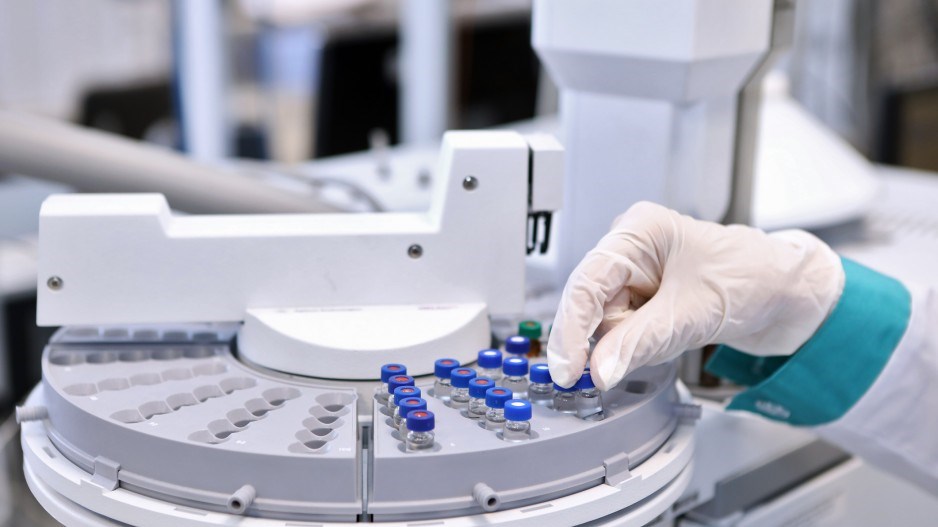When vaccines for COVID-19 began emerging in 2020, Canada’s place in the global queue looked uncertain.
Unlike the U.S. or Europe, where vaccines from Moderna Inc. (NYSE:MRNA) and Pfizer Inc. (NYSE:PFE) are produced, Canada does not possess wide-scale vaccine manufacturing capacity of its own.
Since December, the country has been totally reliant on foreign manufacturers — a reality that’s been highlighted amid ongoing Moderna and Pfizer shortages.
In the years to come, though, it will be a Vancouver company leading the way in terms of Canada’s ability to mass produce vaccines.
Precision Nanosystems Inc. (PNI) has embarked on building a new $50-million biomanufacturing facility after Ottawa revealed Tuesday (February 2) it will cover $25 million of those costs.
James Taylor, CEO of PNI, said plans for such a facility in Metro Vancouver — one capable of producing up to 240 million vaccine doses annually — have been part of the company’s strategic vision for years.
“The government support … has been a great catalyst to be able to bring that to fruition,” he told BIV.
PNI is a provider of technology for the development and manufacturing of genetics medicines that deliver RNA or DNA directly into cells to treat disease at its molecular root cause.
Last fall, Ottawa earmarked $18 million for the company to pursue its own COVID-19 vaccine, which is expected to enter phase 1 of clinical trials this coming summer.
PNI specializes in a class of vaccines known as self-amplifying RNA vaccines.
These have the potential to create more potent vaccines as they amplify the signal, allowing PNI to manufacture more doses for less volume.
The new 40,000-square-foot facility, expected to be completed in March 2023, would be able to produce up to 240 million of those self-amplifying RNA vaccine doses.
Moderna and Pfizer, meanwhile, have been manufacturing conventional messenger RNA (mRNA) vaccines.
Taylor said PNI’s facility would be able to manufacture two million to 24 million mRNA doses — a significant difference compared with the manufacturing capacity for a self-amplifying RNA vaccine.
With PNI’s facility slated to open in 2023, the Vancouver company’s expanded manufacturing capacity does not fit into the federal government’s timeline for vaccinating all Canadians by September 2021.
Instead, it’s poised to play a part in future responses to health crises.
“This facility will be utilized for the production of both therapeutics and vaccines applied to cancer, infectious disease, rare diseases … And then in times of pandemic needs, it will be utilized for pandemic response,” Taylor said.
“If it [PNI’s COVID-19 vaccine] came earlier than [when] the facility was ready for us, our company already partners and provides our technology to contract manufacturing organizations all over the world.”
Taylor said the design utilizes modular cleanrooms.
Anyone walking into the new facility will encounter a controlled environment in which rooms possess dedicated equipment for each step of the manufacturing process.
PNI currently boasts a headcount of 120 workers and Taylor said he plans to hire more than 50 additional workers by the end of the year.
Upon announcing the $25 million earmarked for PNI’s facility, Trudeau said the arrangement will offer the country more domestic manufacturing certainty for years to come.
“We don’t know what the future looks like a year from now, two years from now, three years from now,” he said.
“What we’re very clear on is Canada will be developing domestic manufacturing, so regardless of what could happen in the future, we will have domestic production.”
Wendy Hurlburt, CEO of the LifeSciences B.C. industry group, said the launch of a domestic manufacturing facility will likely further draw more biotech companies to the region.
“Success breeds success for one thing, but also, expertise tends to cluster together,” she said.
“And it really is yet another key milestone for us as we continue to build this world-class ecosystem that is contributing immensely to both the economic recovery of our province, while creating jobs and addressing some of these complex situations and complex issues in our healthcare system.”




